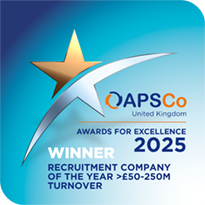Ireland’s labour market is progressing through 2025 on a strong footing, continuing to demonstrate resilience and near full employment despite growing global uncertainties. A recent market report from the Employment and Recruitment Federation (ERF) offers a comprehensive snapshot of employment trends, recruitment activity, and emerging workforce dynamics across the country, recapped below.
The current employment landscape
The Central Statistics Office (CSO) reported a seasonally adjusted unemployment rate of 4.0% in March 2025, significantly below the EU average of 6.1%. Employment figures remain robust, with 2.78 million people employed in Q4 2024, marking a 2.6% year-on-year increase.
This growth has been supported by net inward migration of 79,300 people in 2024, particularly from Ukraine and India, providing a valuable source of talent. Female participation in the workforce has also reached a record high with 61.4% of working-age women now active in the labour market, narrowing the gender participation gap to its lowest level yet.
Wage growth and talent competition
Ireland continues to offer competitive compensation, with average weekly earnings rising by 5.6% in Q4 2024. The country boasts one of the highest minimum wages in the EU (over €2,100 per month) as well as one of the highest average salaries (€58,700), according to Eurostat.
However, the labour market has intensified competition for talent. Skills shortages persist in key sectors such as construction, nursing, accounting, software development, and engineering, with employers increasingly turning to international recruitment and targeted strategies to bridge these gaps.
Recruitment trends: permanent roles hold steady
The report reveals that permanent hiring activity mostly remained stable across the first quarter of 2025. Over 90% of recruitment firms surveyed hire for permanent roles, with around one-fifth filling between 3–5 vacancies per month. While the number of permanent vacancies remained largely unchanged, only 27% of recruiters reported an increase in March, down from earlier months.
In contrast, contract hiring showed signs of decline with 32% of recruiters reporting no contract placements in March, up from 24% in January. Temporary recruitment trends were more volatile, with no clear pattern emerging due to smaller sample sizes and the nature of short-term hiring.
Pay trends: permanent roles lead the way
Salaries for permanent positions were more likely to have increased compared to contract or temporary roles. The January 2025 minimum wage increase contributed to modest uplifts in temporary pay rates, but contract rates remained largely static. This suggests that while employers are willing to invest in long-term hires, they are more cautious with short-term or project-based roles.
Hybrid work preferences and remote decline
The shift in work preferences continues to evolve. Hybrid roles now account for around 12% of job vacancies, reflecting sustained demand for flexible working arrangements. However, fully remote roles have dropped sharply, now comprising just 1.9% of vacancies.
The report shows that one in three adults in Ireland works from home at least one day per week, with higher prevalence among men, parents, and those aged 35–54 from middle to higher socio-economic backgrounds.
Emerging Roles and Skills in Demand
The report also highlights several areas where demand for talent is outpacing supply. These include:
Construction and engineering: Driven by infrastructure projects and housing demand.
Healthcare: Particularly nursing, amid ongoing pressures on the health system.
Finance and accounting: As businesses navigate regulatory changes and economic uncertainty.
Technology: Software development remains a high-demand field, especially for roles in AI, cybersecurity, and data analytics.
Recruiters are responding by expanding their talent searches internationally and investing in upskilling initiatives to meet evolving client needs.
Ireland’s labour market remains a pillar of economic strength, underpinned by high employment, wage growth, and increasing workforce participation. However, this latest labour market report also signals a shift in sentiment, with recruiters and consumers alike bracing for potential headwinds.
As the year progresses, the ability of employers to adapt through flexible work models, competitive pay, and strategic talent sourcing will be key to sustaining momentum in a changing global landscape. Our Ireland recruitment and workforce solutions expertise delivers temporary and permanent resourcing solutions for our clients across a wide range of advanced facilities, infrastructure and engineering projects, so if your own business is looking to secure top candidates to support nationwide projects, please feel free to get in touch to learn how we could help.


.png)


.png)



.jpg)